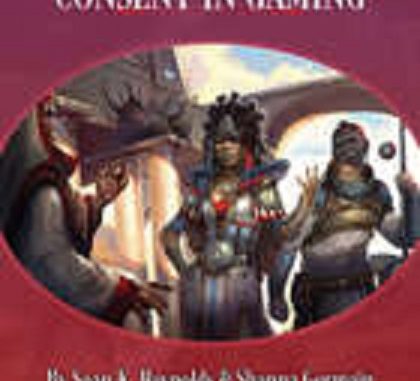
Monte Cook Games’ free PDF (available at Drive Thru RPG) Consent in Gaming is quite different, and more important than, products I have covered in my “Try Before You Buy” feature. It addresses something that we gamers have finally started recognizing as a problem in our hobby: The way we handle themes/topics and ignore concerns about possibly triggering content or encounters in games (or in casual out-of-character “table talk”) is both hurtful and harmful. It’s an old problem. I haven’t forgiven Wizards of the Coasts’ forum mods for, in the D20 Star Wars heyday, not banning the sorry jerk who posted about the crude way he handled an in-character miscarriage–of all things!–and got mad because I called him on it. His poor excuse: “My wife miscarried for real and my post doesn’t bother us.” Eww, gross.
Today, I’d like to think we’ve become a little more aware, in the hobby and in life in general, of why dismissing–or continuing to bring up–things that people have said disturb, upset, or trigger them is wrong. But how can GMs (and players) avoid doing so, especially when not everyone is bothered by the same things or to the same degree? Consent in Gaming is both a discussion about this and a tool–a consent checklist–for getting a group onto the same page on what is okay and not okay during game sessions. So it covers a lot more territory than just sexual stereotypes or harassment. I think of it as “topic consent” or “content buy-in.”
The PDF aims to make getting agreement on stuff like what’s okay and what’s not in the way of themes, and encounters as much a part of campaign prep and “Session Zero” discussions as less-fraught questions such as “What genres do we all like?” “Action, intrigue or both?” and “What kind of PCs will and won’t work?” And it’s meant to make expressing your dislikes and triggers easy and no-stress. The checklist covers everything from common phobias (spiders, claustrophobia) to sex to “-isms” to tornadoes to self-harm, with space to add anything not listed. It’s not just a strict green = yes/red= hard no. There’s a yellow option if you’re not certain, are okay with offstage depictions (e.g., Anakin killing the Temple younglings), don’t want to be blindsided, etc. There’s plenty of room to expand on something, or request the GM speak with you.
Yes there’s a lot on the list that I’d never consider including in a game I’m running–or would be shocked/angry if a GM used them in a game I’m playing in. (There’s things I wouldn’t think twice about including, too, and wouldn’t raise an eyebrow if another GM did.) But that’s the point–you need to know XYZ’s a problem in order to avoid it. Or you might assume no one wants to tackle Serious Theme if they don’t tell you. The Consent Checklist gives you a simple straightforward way to cover it all.
Personally, I don’t feel that all groups need to be this formal about what items are Yeses, Noes, Circumstantial, etc. If the players have been gaming together for years, or are long-time friends who have decided to game together for the first time, filling in the Consent Checklist may not be necessary, because everyone knows everyone else’s likes and limits already. But your long-time group may decide it’s helpful. Maybe a new member is coming in, maybe there’s a Session Zero for the new campaign, so it’s a good time to get everything in writing, or at least have a discussion if everyone is comfortable talking it out. (Some people won’t be, even in a close-knit group.)
This checklist should definitely be part of forming new groups, especially if the prospective players/GMs don’t know each other well, or at all. That’s pretty common today. Many tabletop groups are formed on sites like Meetup or the traditional “Sign-up sheet at the FLGS.” If the group is online, chances are no one has met in person, or only a few times, at cons. Even with the anonymity of a chat, DMs, or forums, (near-) strangers aren’t going to be comfortable talking about many of the line items on the list.
Whether you and your group decide to use that checklist, I think you all should at least read Consent in Gaming, including the checklist. The information is both food for thought and invaluable, and not just for gaming. For instance, there’s a lot on not pressuring someone, whether it’s to go along with an idea they aren’t into, to explain why they don’t want XYZ content, or to stay in a session/situation when something has triggered them. It reassures you that it’s okay to feel however you feel about something–and to change your mind, for any reason, at any time. You will also find suggestions for how to handle situations when a player is upset/triggered, with kindness and without tearing the group up.
Those are just a few things you can read up on and use–not just at the gaming table but in the rest of your life. Go, download, give it a read-through, and think about it. It is worth your while.
Note: The link on p. 12 of the PDF doesn’t go to the Same Page Tool, just the main Bankuei page. Instead use this link.
Credit: Thanks to J. T. Dimino for posting about this on the D20 Radio Facebook page.
